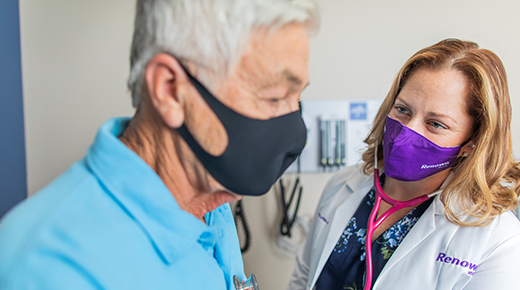Why Am I So Tired? 9 Reasons for Your Chronic Exhaustion
February 27, 2024

Do you find yourself struggling to stay awake during the day or having no energy? You’re not alone. Whether you’re a full-time employee, a student or retiree, that “I’m tired” feeling comes in all shapes and sizes. What’s even more frustrating is not knowing the source of your exhaustion.
Dr. Brandon Flores, a sleep medicine physician with Renown Medical Group, breaks down nine key reasons why you may be feeling so fatigued.
- You did not get enough sleep, or your quality of sleep is poor. This may seem obvious, but in today’s “rise and grind” culture, sleep can be considered a luxury rather than what it really is: a necessity. Ensuring you get adequate hours of sleep between 6-9 hours and quality sleep is essential.
- You may not be breathing well during sleep. Interruptions to your breathing, such as snoring, can decrease airflow at night causing your sleep to be less restorative. This is often due to Obstructive Sleep Apnea (OSA). OSA can lead to daytime fatigue and sleepiness and can also impact other chronic health conditions, such as hypertension, diabetes, acid reflux, migraines and heart rhythm.
- You are not getting enough regular exercise, or you are exercising too much. Incorporating at least 30 minutes a day of physical activity can help keep you energized throughout the day. It has also been shown to increase deep slow wave sleep, which is often associated with feeling rested. On the other hand, getting too much exercise can tire you out more easily and heighten stress levels.
- You drink too much caffeine. This one may seem counterintuitive – caffeine is supposed to keep you awake, right? Well, overdoing it with your favorite coffee or soda could affect your sleep quality. Pay attention to your caffeine limits and have a cut-off time, as most caffeine should not be consumed past noon.
- You have a food allergy or intolerance. If you find yourself feeling especially tired after eating a lot of a certain food, you could have an allergy or intolerance to it – and vice versa. Consider speaking with your primary care provider (PCP) about a food allergy test or being referred to an allergist.
- You’re drinking too many alcoholic beverages. Alcohol is a depressant, which as the word implies, can make you feel especially tired during the day. It can also affect your breathing at night and disrupt your sleep cycle. Cutting back on alcoholic drinks may be beneficial to your overall health.
- You are anemic. This is the leading cause of fatigue in women but can affect people of all genders. It can be associated with low iron. Eating foods high in iron, including leafy greens and many different meats, can help your iron levels. A blood test ordered by your PCP can help you understand if you are iron deficient.
- You are experiencing depression or anxiety. Emotional exhaustion can be just as taxing as physical exhaustion. Prolonged feelings of sadness, hopelessness, nervousness or panic can be signs and symptoms of depression or anxiety. Speak with your provider about the many resources available to help you.
- You have an underactive thyroid. Feeling fatigued can also be a symptom of hypothyroidism, which affects your metabolism and energy levels. Medication can help get your thyroid back to normal. Your PCP can order a blood test to determine your thyroid levels.
If you experience severe exhaustion that lasts six months or longer, worsens after physical or mental exertion and does not get better after resting, it could be a sign of myalgic encephalomyelitis, otherwise known as chronic fatigue syndrome (CFS). This is a diagnosis of exclusion, and other causes must be ruled out. While there are no tests that detect CFS, your provider can order blood and urine tests to rule out other causes of your fatigue and help develop a care plan.
Schedule An Exam
